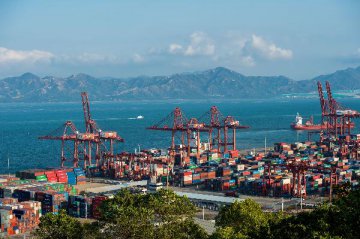
Overseas investment banks are optimistic on China’s economy recently, and looking forward to investment targets which represent future economy of China. In their eyes, speeding-up transformation of economic structure, rebounded industrial economy and rising new economy predict a new future for China’s economy, and also form a new value for China’s investment targets. Convenient investment channel and huge market opportunities are increasingly expected by the market.
“Foreign funds become more interested in inland asset investment of China.”
Along with stabilization and rebound of China’s economy, foreign funds highly appreciate investment targets in China, Hu Yifan, China-related economist at UBS, told the SSN journalist.
Not only UBS, but also overseas investment banks are commonly optimistic on China’s economy, and keep close eyes on investment targets which can represent the economic future of China, journalist learnt. In their eyes, speeding-up transformation of economic structure, rebounded industrial economy and rising new economy predict a new future for China’s economy, and also form a new value for China’s investment targets. Convenient investment channel and huge market opportunities are increasingly expected by the market.
Speeding-up openness introduces more investment choices
Overseas investors optimistic on China’s economy will invest in Chinese stock market for a long run, especially the blue chips, and bond market, Zhou Hao, Commerzbank’s senior Asia-related economist based in Singapore, told the journalist. The arriving launch of Shenzhen-Hong Kong Stock Connect program will better benefit the overseas funds having already invested in China.
The coming launch of the said program, expectation that A shares will be included in MSCI index, and RMB being officially included in the SDR in October also attract an increasing number of foreign funds to invest in RMB-based assets, Hu mentioned.
Since this year, China’s interbank bond market has constantly opened with relatively high yield ratio for 10-yr Treasury bonds, making it fully attractive to overseas investors, he believed.
Stressing that foreign investors become more interested in China’s interbank bond market, especially governmental bonds, Yan Se, senior China-related economist at SCB, shared an “interesting” phenomenon in the interview that the capital flowing in China for the third quarter was surprisingly less than that for the second quarter.
As some funds previously flowing in China through RQFII, QFII, Shanghai-Hong Kong Stock Connect program and other channels begin to come in through China’s interbank bond market, Yan believed after analysis.
New economic chips put in investment target pool
“Economic structure of the inland is gradually transforming, and traditional sectors’ proportion in the economy will reduce step by step; along with the rising of new economic sectors, such as telecom technology, e-consumption, tourism, new energy and environmental protection, the sector profit is expected to achieve a high growth.” These sectors are very attractive to overseas investors, Feng Xiaozhong, executive director and also head of global bank & capital market business department at Hang Seng Bank, told the journalist.
Liu Jinjin, managing director and also chief strategist at Great China of Goldman Sachs, also put chips of new economy in his “basket”.
Liu and his team advice four investment orientations for international investors: 1) industries and sectors representing “new economy of China”; 2) stocks with growth which will provide rational risk/yield ratio for foreign investors; 3) stocks with heavy position in the QFII; 4) stocks meeting the constant growth framework defined by Goldman Sachs.
New highlights of China’s economy provide more choices for overseas investment banks.
In terms of A-share market, Feng is also optimistic on its industries with unique feature and growth, such as alternative consumption, IT, medicine & health care and etc. “The profit growth rate of the mentioned industries is higher than that of other industries and overall one of A-share market, which are more attractive to foreign institutional investors.”
Overseas investors increasingly raise their investment proportion for Chinese-governmental credit bonds and bonds of National Development Bank, according to Yan. Foreign financial institutions bought more Chinese-governmental bonds in the third quarter, SCB’s research and data also show.
The RMB has been officially included in the SDR in October, and some investment institutions of foreign countries also bought more RMB-based assets as reserve, Yan introduced. These investment institutions now are mainly central banks and sovereign wealth funds. Hedge funds, sovereign institutions and so on will increasingly step in China’s interbank bond market which has fast opened since this year. “The said market does not set quota limit with simple operations, and many overseas
Along with further openness of China’s interbank bond market, more overseas institutional investors will step in, Hu expected. For details, the yield ratio of 10-yr Treasury bond is 2.8 percent, very attractive worldwide. The exchange rate of CNY/USD declines, but RMB still keeps stable on the whole compared to other currencies. These will attract foreign investors.
Currently, some overseas institutional investors are at primary stage to step in China’s interbank bond market, busy in applying for registration, and they have not carried out investment operations yet. After registration, they will increase their investments in this market, Yan pointed out.
Translated by Jelly Yi




















Latest comments